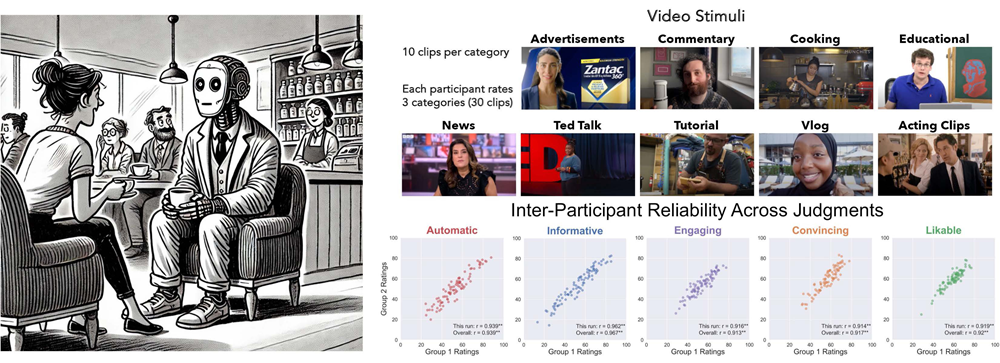By Tomer Ullman and Ilona Bass
We generally care about the mental lives of other people. When our friend does something, we often wonder “why did they do that?”. Reasoning about the hidden mental states of others — their goals, desires, emotions, and beliefs – is known as ‘Theory of Mind’, and it is a basic building block of human cognition.
And yet, there are probably many situations where we don’t reason about the inner lives of others. When a person taking your order at the coffee shop asks if you would like milk with your coffee, you probably don’t think about the complicated web of beliefs and desires that led them to ask that, because there are none. They are doing their part in the coffee-shop script, just like you are.
Research that examines decision making generally breaks down our own actions in two categories: automatic, and reflective. This distinction is one of the most well-studied areas of research in cognitive science and neuroscience. However, there has been a lot less work (by comparison) on this distinction in how we reason about *other* people. Do people consistently notice when others are behaving in a scripted way? How do they do this? Why do they care? In a new paper, we shine a light on reasoning about automatic behavior in other people, the noticing that someone else is behaving in an automatic, rote, or scripted fashion.
We first wanted to establish how common this phenomenon even is. We asked a large representative sample of the US population (3,000 people) to report on their experiences with this kind of behavior. We found that a large percentage of people (roughly half) report that many of their daily interactions are such that the other person is acting in a scripted way. These findings held for men, women, older and younger people, people of higher and lower education: everyone experiences this phenomenon. People also reported many examples from daily life, which cut across different domains and situations. While it was unsurprising to read reports of such behaviors in the checkout line or office small-talk, people also reported such behaviors in intimate relationships, with friends and loved ones, partners, family members, caretakers and doctors. All in all, it seems that the perception of automatic
behavior in others is a pervasive part of daily social life. This is important, as scripted behavior is not well captured in our current scientific understanding of ‘Theory of Mind’.
In a follow-up study, we examined the robustness and reliability of the perception of automaticity. While it seemed like a major part of daily life, maybe people actually understood this to mean different things? On the way to studying this further, it is important to first establish that such behavior is generally agreed on. We recruited approximately 1,600 people, and showed them brief videos taken from a variety of sources (ads, vlogs, educational videos, TED talks, news, tutorials, commentaries, day-in-the-life, and so on). We asked people to quickly judge the persons in the videos based on how automatic/rote they seemed, and also based on how informative, engaging, convincing, or likable they were.

Left: People often have the impression that their social partner is acting in a scripted or robotic way. In a large-scale, representative survey many people reported that many of their daily interactions were such that the other person seemed robotic or automatic. Right: Participants in a large scale study were shown dozens of short video clips from a variety of domains and sources. People strongly agreed with one another on how ‘scripted’ the persons in the video were, and these judgements were separate from other, related judgements.
We found that people made fast, reliable judgements. That is, people strongly and consistently agreed with one another about what behavior counts as ‘rote’ or ‘scripted’. This perception was also different from the other attributes we looked at: Someone could be convincing and robotic (or not), engaging and scripted (or not), and so on. This study showed that people quickly attribute automaticity to others’ behavior, that this attribution is reliable, and that the perception of automaticity is distinct from the perception of other, related attributes.
Based on our findings, and general theoretical considerations, we argued that reasoning about scripted behavior in others is an important but mostly uncharted territory in cognitive research. The work leaves open many questions that we are currently exploring. For example, *how* do people make these judgements? The fact that people agreed with one another suggests there are reliable cues and features of this detection. Finding those could be useful in the design of non-human agents. We’re also interested in the downstream consequences of this detection: When you notice a cashier is scripted, that probably doesn’t matter to you. But if your doctor, teacher, or loved one is being scripted, that might be a problem. As our society moves towards building robots that seem more and more human, we need to better understand the many situations in which we see other humans as more or less robots.
Ilona Bass is a post-doctoral Research Fellow funded by an NSF STEM Education Postdoctoral Research Fellowship; she works in the Computational Cognitive Development Lab at the Harvard Graduate School of Education, and the Computation, Cognition, and Development Lab in the Department of Psychology.
Tomer Ullman is an Assistant Professor; he heads the Computation, Cognition, and Development Lab at Harvard.
Learn more in the original research article:
The detection of automatic behavior in other people
Ullman TD, Bass I. Am Psychol. 2024 Dec;79(9):1322-1336.
News Types: Community Stories
